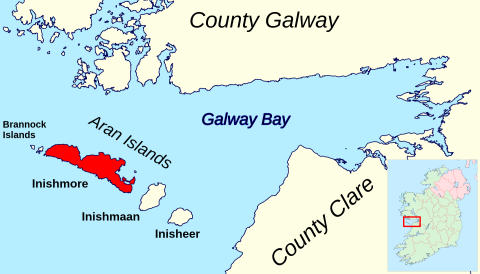[1] Dēfīnīvit igitur Sānctus Brendānus, et hī quī cum eō erant, ieiūnium quadrāgintā diērum, semper per trīduānās, et posteā proficīscī. [2] Trānsāctīs iam quadrāgintā diēbus, et salūtātīs frātribus, commendātīsque omnibus praepositō monastēriī suī, quī fuit posteā suus successor in eōdem locō, profectus est contrā occidentālem plāgam cum quattuordecim frātribus ad īnsulam cuiusdam sānctī patris, nōmine Aende. [3] Ibique dēmorātus est tribus diēbus et tribus noctibus.
notes
After fasting for forty days, Brendan and his fourteen monks sail off to visit St. Enda of Aran (presumably to ask his advice).
Similarly, Aeneas consulted with Anius, a priest of Apollo (Vergil, Aeneid 3.80–84); such consultations feature in other medieval stories.
[1] semper per trīduānās: = semper per trīduānās (diēs); they fasted every third day.
[2] commendātīsque omnibus: “with all things entrusted.”
praepositō: dative. The praepositus (“prior”) was head of an individual church or cell; he was subordinate the the abbot, who was head of the churches and cells collectively.
quī fuit posteā suus successor in eōdem locō: i.e., he was Brendan’s successor as abbot of Clonfert; his identity is unknown.
ad īnsulam cuiusdam sānctī patris, nōmine Aende: i.e., Saint Enda of Aran (d. c. 530 CE), “the patriarch of Irish monasticism.” He is thought to have founded the first monastery in Ireland, at Killeany, on Inishmore, one of the Aran Islands, off the west coast of Ireland.
vocabulary
| dēfīniō dēfīnīre dēfīnīvī (dēfīniī) dēfīnītus | to ordain, designate [OLD 4b] 1 |
| ieiūnium –iī n. | a fast |
| quādrāginta; quādrāgesimus –a –um |
40; 40th |
| per | through; by means of [OLD 14] |
| trīduānus –a –um | lasting three days |
| trānsigō trānsigere trānsēgī trānsāctum | to carry through, complete; to spend, pass 2 |
| quādrāginta; quādrāgesimus –a –um |
40; 40th |
| salūtō salūtāre salūtāvī salūtātus | to greet; bid farewell to [OLD 3] |
| commendō commendāre commendāvī commendātus | to entrust, recommend, approve |
| praepositus –ī m. | chief, overseer, steward; (ML) prior |
| monastērium –ī n. | a monastery |
| successor –ōris m. | a follower, successor |
| contrā | against; towards, in the direction of [OLD 14a] |
| occidentālis –e | of the west, westerly |
| plaga –ae f. | open expanse, tract; region |
| quattuordecim; quārtus –a –um decimus –a –um |
14, 14th |
| Aedne m. | Enda |
| dēmoror –ātus sum | to linger, delay, stay3 |

